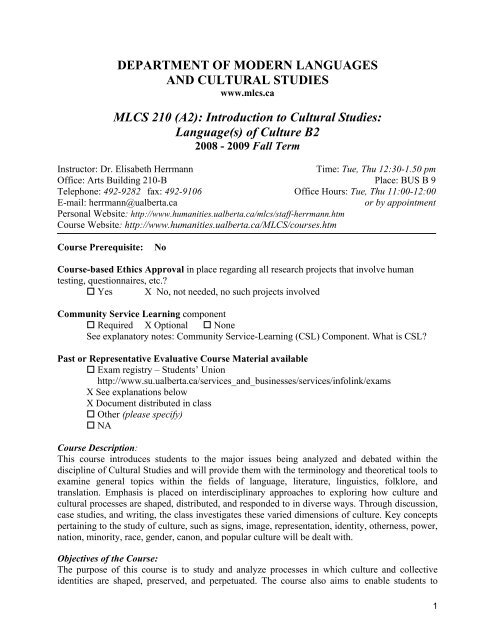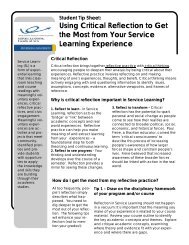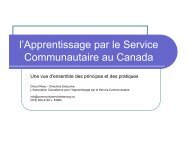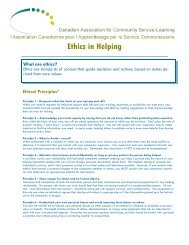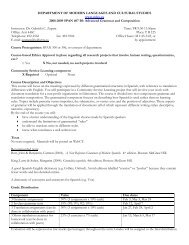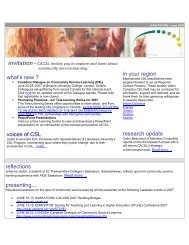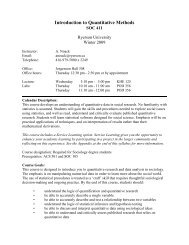MLCS 210 Language(s) of Culture - The Canadian Alliance for ...
MLCS 210 Language(s) of Culture - The Canadian Alliance for ...
MLCS 210 Language(s) of Culture - The Canadian Alliance for ...
You also want an ePaper? Increase the reach of your titles
YUMPU automatically turns print PDFs into web optimized ePapers that Google loves.
DEPARTMENT OF MODERN LANGUAGES<br />
AND CULTURAL STUDIES<br />
www.mlcs.ca<br />
<strong>MLCS</strong> <strong>210</strong> (A2): Introduction to Cultural Studies:<br />
<strong>Language</strong>(s) <strong>of</strong> <strong>Culture</strong> B2<br />
2008 - 2009 Fall Term<br />
Instructor: Dr. Elisabeth Herrmann Time: Tue, Thu 12:30-1.50 pm<br />
Office: Arts Building <strong>210</strong>-B Place: BUS B 9<br />
Telephone: 492-9282 fax: 492-9106 Office Hours: Tue, Thu 11:00-12:00<br />
E-mail: herrmann@ualberta.ca or by appointment<br />
Personal Website: http://www.humanities.ualberta.ca/mlcs/staff-herrmann.htm<br />
Course Website: http://www.humanities.ualberta.ca/<strong>MLCS</strong>/courses.htm<br />
Course Prerequisite: No<br />
Course-based Ethics Approval in place regarding all research projects that involve human<br />
testing, questionnaires, etc.?<br />
� Yes X No, not needed, no such projects involved<br />
Community Service Learning component<br />
� Required X Optional � None<br />
See explanatory notes: Community Service-Learning (CSL) Component. What is CSL?<br />
Past or Representative Evaluative Course Material available<br />
� Exam registry – Students’ Union<br />
http://www.su.ualberta.ca/services_and_businesses/services/infolink/exams<br />
X See explanations below<br />
X Document distributed in class<br />
� Other (please specify)<br />
� NA<br />
Course Description:<br />
This course introduces students to the major issues being analyzed and debated within the<br />
discipline <strong>of</strong> Cultural Studies and will provide them with the terminology and theoretical tools to<br />
examine general topics within the fields <strong>of</strong> language, literature, linguistics, folklore, and<br />
translation. Emphasis is placed on interdisciplinary approaches to exploring how culture and<br />
cultural processes are shaped, distributed, and responded to in diverse ways. Through discussion,<br />
case studies, and writing, the class investigates these varied dimensions <strong>of</strong> culture. Key concepts<br />
pertaining to the study <strong>of</strong> culture, such as signs, image, representation, identity, otherness, power,<br />
nation, minority, race, gender, canon, and popular culture will be dealt with.<br />
Objectives <strong>of</strong> the Course:<br />
<strong>The</strong> purpose <strong>of</strong> this course is to study and analyze processes in which culture and collective<br />
identities are shaped, preserved, and perpetuated. <strong>The</strong> course also aims to enable students to<br />
1
elate theories and concepts <strong>of</strong> collective identity, otherness, or minority to their studies <strong>of</strong><br />
different languages and cultures, as well as to their daily experience <strong>of</strong> culture in a multicultural<br />
society and within the international scene.<br />
Further goals <strong>of</strong> the course are:<br />
- to increase the identification and recognition <strong>of</strong> what culture is.<br />
- to introduce different cultures and processes <strong>of</strong> cultural shaping and interaction.<br />
- to make students aware <strong>of</strong> how different cultures are manifested in our community, as well as<br />
how culture and cultural phenomena directly impact daily life.<br />
Texts:<br />
Course Textbook and Materials:<br />
Required (available at U <strong>of</strong> A bookstore):<br />
Lustig, Myron W., and Koester, Jolene, Intercultural Competence: Interpersonal Communication<br />
Across <strong>Culture</strong>s. 5 th ed. Boston: Allyn and Bacon, 2006.<br />
Recommended:<br />
Since you will produce written work throughout the course, and will be required to provide<br />
complete bibliographic in<strong>for</strong>mation <strong>for</strong> all assignments, it is necessary that you use a correct and<br />
consistent citation style. I highly recommend the MLA citation style, an explanation <strong>of</strong> which can<br />
be found in a writing guide, such as Hacker, Diana, A <strong>Canadian</strong> Writer’s Reference. 3 rd ed.<br />
Boston: Bed<strong>for</strong>ds/St. Martin’s, 2004.<br />
Supplementary reading and research<br />
(available at Library “on reserve” or contact the instructor):<br />
Lustig, Myron W., and Koester, Jolene (Eds.), AmongUS: Essays on Identity, Belonging, and<br />
Intercultural Competence. 2 nd ed. Boston: Allyn and Bacon, 2006.<br />
Gannon, Martin J., Understanding Global <strong>Culture</strong>s. Metaphorical Journeys Through 23 Nations.<br />
2 nd ed. London: Thousand Oaks, 2000 (or any <strong>of</strong> the following editions).<br />
Sardar, Ziauddin, Loon, Boris Van: Introducing Cultural Studies. Thriplow, Royston: Icon<br />
Books, 2003.<br />
Jandt, Fred E. (Ed.), Intercultural Communication. A Global Reader. London: Thousand Oaks,<br />
2004.<br />
Holliday, Adrian, Hyde Martin, and Kullman, John, Intercultural Communication. An Advanced<br />
Resource Book. London, NY: Routledge, 2004.<br />
Kiesling, Scott F., Bratt Paultson, Christina (Eds.), Intercultural Discourse and Communication.<br />
<strong>The</strong> Essential Readings. Ox<strong>for</strong>d: Blackwell, 2005.<br />
Macfadyen, Leah P. and Roche, Jörg, Communicating across <strong>Culture</strong>s in Cyberspace.<br />
A Bibliographical Review <strong>of</strong> Intercultural Communication Online. New Brunswick:<br />
Transaction, 2004.<br />
2
Course Activities and Conduct in Class<br />
This course combines lectures, guest lectures with small and large group discussions, and student<br />
presentations. You can expect to work in groups on a regular basis. You can also expect to write<br />
<strong>for</strong>mally and in<strong>for</strong>mally. You are supposed to share your readings and practical experiences with<br />
the class. Students may find some <strong>of</strong> the course material personally or intellectually demanding in<br />
that it might challenge their assumptions about identity, cultural affiliation, mindset, minority,<br />
subcultures etc. Such challenges are expected and are part <strong>of</strong> the critical engagement encouraged<br />
in the course (i.e., active listening, reconsideration, reflection). <strong>The</strong> respectful treatment <strong>of</strong> others<br />
is an essential part <strong>of</strong> this engagement, and is a requirement <strong>of</strong> the course. Well-thought out<br />
differences <strong>of</strong> opinion are more than welcome, but personal attacks are not. All members <strong>of</strong> the<br />
class are best served by a non-judgmental, non-threatening, respectful atmosphere.<br />
Readings and Preparation<br />
You are expected to come to class prepared to discuss the day’s assigned readings. Please be sure<br />
to bring the reading material with you to class.<br />
When you are reading, look <strong>for</strong> key concepts: this means terms or phrases that the author uses<br />
repeatedly and that seem integral to his or her main idea or argument. Jot these words or phrases<br />
down, and try to define or explain them in your own words in 2-4 sentences. Identify key<br />
quotations or phrases as well. It’s <strong>of</strong>ten useful to include the page or paragraph number as you<br />
note these ideas. (It makes writing about a text a lot easier later).<br />
While reading and making notes, ask yourself:<br />
• What major ideas does this author want me to understand or take away from the text?<br />
• What ideas fit with my understanding <strong>of</strong> the world and what ideas do not fit?<br />
• How does one particular perspective fit with or challenge other ideas that we’ve<br />
discussed?<br />
• Does the theory seem relevant to your life? Does it even make sense?<br />
• What do I not understand from this text? After reading it carefully, what am I still<br />
confused about?<br />
Note: You are responsible <strong>for</strong> obtaining any handouts and materials that may be distributed in<br />
class, and <strong>for</strong> viewing any films that we might watch in class.<br />
COMMUNITY SERVICE-LEARNING (CSL) COMPONENT – What is CSL?<br />
Community Service-Learning integrates community-based activities with classroom learning.<br />
Students volunteer with a non-pr<strong>of</strong>it community organization (list will be available in September)<br />
<strong>for</strong> a minimum <strong>of</strong> 20 hours over the semester. You will be expected to maintain an engaged<br />
presence in the community throughout the semester and to reflect on your experiences regularly<br />
using course content as a basis <strong>for</strong> your understanding and analysis. For this course, the nonpr<strong>of</strong>it<br />
organizations you may choose to work with specialize in different cultures, immigration,<br />
integration, global education, minorities, the arts, films, customs, environment, and human rights.<br />
Students will be expected to begin their placements by the end <strong>of</strong> September.<br />
For further in<strong>for</strong>mation about CSL: http://www.u<strong>of</strong>aweb.ualberta.ca/arts/CSLhome.cfm.<br />
3
Why volunteer<br />
• To make a difference<br />
• To become active<br />
• To become aware <strong>of</strong> the variety <strong>of</strong> cultures contributing to and designing our community<br />
• To broaden your horizons<br />
• To combine learning new languages with learning about culture<br />
• To experience other cultures and get in touch with ‘the world’<br />
• To experience the ‘real’ effects, demands, and advantages <strong>of</strong> a multicultural and<br />
intercultural society<br />
• To identify what is being done to help people integrate into our culture<br />
• To see the intersections between theory and practice<br />
• To see the disjunctions between theory and practice<br />
• To open a privileged window into human interaction and community-making<br />
• To learn about global understanding and gain intercultural competence<br />
• To become an active member <strong>of</strong> the local community<br />
Possible CSL Partner Organisations<br />
• Aboriginal Students’ Service Centre<br />
• <strong>The</strong> Environmental Coordination Office <strong>of</strong> Students (ECOS)<br />
• AGAPE, focus group considering issues in relation to sex, sexual, and gender differences<br />
in education and culture<br />
• International Centre Global Education Program<br />
• Active Citizens Television (ACTV)<br />
How to participate / How do I do this?<br />
On the first day <strong>of</strong> class, all interested students will receive a list <strong>of</strong> CSL partner organizations<br />
with descriptions <strong>of</strong> placements, and a copy <strong>of</strong> the CSL guidebook.<br />
Between September 9 and September 16, all students who are interested in the CSL option should<br />
indicate their interest by sending me a brief email specifying which two organizations they would<br />
most like to work with and why. <strong>The</strong>re are only a certain number <strong>of</strong> placement spots available, so<br />
your first choice may not be available. Be prepared to work with either organization that you<br />
select. <strong>The</strong> first 15 students to send me an email explaining their choices will receive<br />
confirmation from me telling them that they may proceed to the next step.<br />
Once you receive confirmation, contact your selected organization, and tell them that you are a<br />
CSL student from “<strong>MLCS</strong> <strong>210</strong>: <strong>Language</strong>(s) <strong>of</strong> cultures,” and arrange to meet with a<br />
representative from that organization to get started.<br />
Fill out the CSL Student Agreement <strong>for</strong>m (see CSL guidebook), which details how you will work<br />
with that organization.<br />
Community organizations are busy, so be persistent but polite about trying to reach them.<br />
Your participation in CSL is <strong>of</strong>ficial only once your agreement <strong>for</strong>m has been signed by your<br />
community partner and returned to me.<br />
<strong>The</strong> Student Agreement <strong>for</strong>m must be returned absolutely no later than Thursday, September 25,<br />
2008.<br />
4
Assignments and Grade Distribution:<br />
CSL Students (integrating Community Service Learning)<br />
CLASS PARTICIPATION (10%)<br />
• Discussion, group work, and contribution throughout the term 10%<br />
COMMUNITY SERVICE NOTEBOOKS (20%)<br />
• To be handed throughout the term <strong>for</strong> feedback (see note below) 10%<br />
• In<strong>for</strong>mal brief in-class CSL-experience report: Various dates (see schedule) not graded<br />
• Final Submission: Thursday, November 20, 2008 10%<br />
FINAL PROJECT (40%)<br />
• Proposal Due: Thursday, November 6, 2008 (see note below) 10%<br />
• 15-20 minute research presentation (see note below) 10%<br />
Due: Sept 23, 25, Oct 7, 9, 30, Nov 4, 6<br />
• Paper Due: Thursday, December 2, 2008 20%<br />
FINAL EXAM (30%) 30%<br />
• Wednesday, December 10, 2008, from 2.00-4.00 pm<br />
• Approximately 30 multiple choice and true/false questions and 20 written answers<br />
• Focus on Key Concepts<br />
CS Students (regular Cultural Studies)<br />
CLASS PARTICIPATION (10%)<br />
• Discussion, group work, and contribution throughout the term 10%<br />
COURSE NOTEBOOKS (20%)<br />
• To be handed in twice during the term <strong>for</strong> feedback (see note below) 10%<br />
• Final Submission: Thursday, November 20, 2008 10%<br />
READING REPORT / RESOURCE REVIEW (10%)<br />
• In groups <strong>of</strong> 3 or 4, you will review a text plus a printed, online or visual cultural or<br />
intercultural resource. It may be related to the language and culture you are studying.<br />
• 1-2 page written review 5%<br />
• 20-25 minute presentation. Various dates (see schedule) 5%<br />
FINAL PROJECT (30%)<br />
• Proposal Due: Thursday, November 6, 2008 (see note below) 10%<br />
• In<strong>for</strong>mal brief in-class research presentation (see note below) not graded<br />
Due: week 11, 12, 13<br />
• Paper Due: Thursday, December 2, 2008 20%<br />
FINAL EXAM (30%)<br />
• Wednesday, December 10, 2008, from 2.00-4.00 pm<br />
• Approximately 30 multiple choice and true/false questions and 20 written answers<br />
• Focus on Key Concepts 30%<br />
5
Explanatory Notes on Assignments:<br />
NOTEBOOKS<br />
Your notebooks are designed to help you explore connections between course material, reading,<br />
discussion and your own experience in daily life and / or at your service-learning placement.<br />
<strong>The</strong> notebooks are due throughout the term (see dates below) and will be graded according to the<br />
following criteria: content (see below); evidence <strong>of</strong> critical thought, including good questions;<br />
development and creativity <strong>of</strong> ideas; depth and understanding <strong>of</strong> course concepts; consistent<br />
ef<strong>for</strong>t; organization and clarity; and searching <strong>for</strong> and using bibliographic in<strong>for</strong>mation.<br />
Style and organization:<br />
<strong>The</strong> notebook is not intended to be a ‘finished product.’ It is a place to work out your ideas by<br />
writing about them (and/or using visual images), so I am not looking <strong>for</strong> grammatical perfection<br />
or total coherence. Still, you are handing it in <strong>for</strong> grades. Quality, engagement, and ef<strong>for</strong>t will be<br />
more easily (and favorably) assessed if the notebook is well organized and written clearly and<br />
legibly. All notebook entries must be typed by the time you hand them in!<br />
General Content Guidelines <strong>for</strong> all Students:<br />
• All entries should be dated. Include a log <strong>of</strong> dates on which you per<strong>for</strong>med key activities.<br />
• Feel free to include a few drawings/images, random thoughts, cultural artifacts, or references to<br />
media stories that have some relevance to the course, and that provoke particular reactions or<br />
ideas.<br />
• On the days when your notebook is being reviewed, you should continue to contribute to it.<br />
CSL Students (integrating Community Service Learning)<br />
• Your entries will report and reflect on your community service-learning placement:<br />
the practices and goals <strong>of</strong> your organization, the specific work you are doing, situations you<br />
encounter, etc.. This can and should include personal thoughts and reactions, but should<br />
primarily report on key experiences and observations arising in your CSL placement.<br />
• Whenever possible, your entries should also reflect on how experiences and observations in<br />
your CSL placement relate to course material. Consider how course materials and your CSL<br />
experiences in<strong>for</strong>m, overlap with, or even contradict each other.<br />
CS Students (regular Cultural Studies)<br />
• Your notebook is primarily a place to work out ideas and concepts discussed in class.<br />
Consider it an archive <strong>of</strong> your interactions with class material: readings, lectures, discussions,<br />
presentations, discovered materials and resources.<br />
• Your notebook may also include reflections on your observations <strong>of</strong> everyday life or<br />
experiences outside <strong>of</strong> the classroom (past and present) as they relate to the issues and ideas<br />
raised in the course. Consider how course materials and your experiences in<strong>for</strong>m, overlap with,<br />
or even contradict each other.<br />
All Students<br />
• All students should also use their notebook to pose questions that draw on personal experiences<br />
(CSL and otherwise) to illustrate, challenge, extend, or otherwise engage with some <strong>of</strong> the key<br />
issues focused on each week.<br />
• All students are encouraged to use their notebook as a running record <strong>of</strong> any materials and<br />
6
ideas that build toward their final paper. Ideally, the more consistently you put ef<strong>for</strong>t into your<br />
notebook, the more ideas you will have <strong>for</strong> your final paper.<br />
• Making entries in the notebook at least once a week – especially when your memories <strong>of</strong><br />
readings, discussions, and experiences are still fresh – will serve you well.<br />
• Most importantly, remember that the notebooks are <strong>for</strong> your own benefit!<br />
Suggested content:<br />
CSL Students (Community Service Learning)<br />
Initial Entries<br />
• Decision about community placement: Why did you choose it? What interests you about it?<br />
• Initial impressions <strong>of</strong> your placement and organization, especially as they might fit with themes<br />
and material from the course.<br />
• Descriptions <strong>of</strong> experiences and activities in the placement.<br />
• Activities, materials, aspects <strong>of</strong> your placement that have especially caught your attention.<br />
Later Entries<br />
• Continued descriptions <strong>of</strong> experiences and activities in placement.<br />
• Critical understanding <strong>of</strong> your placement, esp. as it raises questions about the course material or<br />
as course material helps to frame ideas about your organization and your work.<br />
• Move towards a description <strong>of</strong> the direction you’ll take <strong>for</strong> your final paper, what themes/<br />
readings in the course you will draw upon, any questions with which you’re struggling, and<br />
what further research you might do to help address these questions.<br />
In<strong>for</strong>mal brief in-class CSL-experience report<br />
All CSL Students are strongly encouraged and expected to share their observations, learning,<br />
challenges, or “light bulb moments” experienced within their CSL activities with the class. <strong>The</strong>se<br />
in<strong>for</strong>mal 5-10 minute reports should be based on one or more notebook entries but won’t be<br />
graded.<br />
CS Students (regular Cultural Studies)<br />
Initial Entries<br />
• Discussion <strong>of</strong> how initial course themes/material seems to match or challenge your expectations<br />
<strong>of</strong> the course.<br />
• Situate yourself in terms <strong>of</strong> the course material. How do you see yourself (or not) reflected in<br />
early material? What surprises you about the material or about your reactions to the material?<br />
• Activities, materials, aspects <strong>of</strong> the course that have especially caught your attention.<br />
Later Entries<br />
• Continued engagement with course materials (readings, discussions, presentations, lectures).<br />
• Provide evidence <strong>of</strong> your critical understanding <strong>of</strong> materials by asking questions that link to<br />
everyday/personal experiences.<br />
• Identify instances <strong>of</strong> cultural intersection and encountering – based on readings and/or personal<br />
experience.<br />
• Look <strong>for</strong> academic resources and bibliographic material that you find helpful, and list them in<br />
your notebook.<br />
• Move towards a description <strong>of</strong> the direction you’ll take <strong>for</strong> your final paper. What themes/<br />
readings in the course will you draw on, any questions with which you’re struggling, and what<br />
further research you might do to help address these questions.<br />
7
Handing in your notebook<br />
Twice during the term in alternating order:<br />
September 25<br />
October 2<br />
October 16<br />
October 23<br />
I will provide interim feedback on journal entries throughout the term: Students whose last names<br />
begin A to M will hand in their journals on the following Thursdays: September 25, October 2.<br />
Students whose last names begin N to Z will hand in their journals on the following Thursdays:<br />
October 16, October 23. Please note that I do not accept notebooks or papers submitted via email!<br />
READING REPORT / RESOURCE REVIEW (CS Students only)<br />
In groups <strong>of</strong> 2 or 3, choose and review a text relevant to Cultural Studies plus an article, report,<br />
film, or online source that has an explicitly cultural or intercultural approach, deals with “cultural<br />
identity”, “belonging”, “otherness”, “race”, “multiculturalism”, “minority”, “gender”,<br />
“subculture”, or “intercultural communication” and relates to the key concepts <strong>of</strong> Cultural Studies.<br />
As a group, write a 1-2 page (typed, double-spaced, 12-point font) review <strong>of</strong> the selected<br />
resources.<br />
<strong>The</strong> goal here is to find resources to share with the class that will not only compliment our<br />
readings, but also establish a bridge between the theoretical concepts we are learning about in<br />
class, your studies <strong>of</strong> different languages and cultures, and daily experience <strong>of</strong> culture in society,<br />
business, or travel.<br />
You may choose a source from the “Supplementary Reading and Research List” on page 2 <strong>of</strong> the<br />
syllabus, or you may find a source <strong>of</strong> your own, but I must be in<strong>for</strong>med about that source and<br />
have the chance to approve it at least two weeks be<strong>for</strong>e your presentation.<br />
Guidelines <strong>for</strong> review (you might also use these as a way to distribute the work):<br />
1. Your review should succinctly summarize the content <strong>of</strong> the source and identify, where<br />
relevant, the author or initiator.<br />
2. Your review should include a brief evaluation <strong>of</strong> the resource. By this I mean you<br />
should assess the source’s significance <strong>for</strong> Cultural Studies and Intercultural<br />
Communication.<br />
3. You should also strive to link your chosen resource to course material and, <strong>of</strong> course, to the<br />
objectives <strong>of</strong> the course. Consider, <strong>for</strong> example, how your resource demonstrates the<br />
“practical” application <strong>of</strong> a theoretical concept we have studied.<br />
In the 20-25 minute group presentation, in<strong>for</strong>m the class about your resource (you might even<br />
show or hand out a photocopy <strong>of</strong> the resource/online resource you are using). Summarize your<br />
written review and expand on what you deem to be the most relevant aspects <strong>of</strong> the resource.<br />
Elaborate on how the resource is linked to course material. <strong>The</strong> presentation will be graded<br />
according to the following criteria: organization and clarity; content; evidence <strong>of</strong> critical<br />
thoughts; development and creativity <strong>of</strong> ideas including good questions that might advance to a<br />
discussion in class.<br />
FINAL PROJECT<br />
<strong>The</strong> final project is designed to provide you with an opportunity to use your observations,<br />
experiences, learning, and critical thinking as well as your communication and writing skills to<br />
8
create something useful that you can share with your class, and even with your organization or<br />
community.<br />
For CSL students, this project will combine critical analysis <strong>of</strong> CSL placement experiences with<br />
academic research.<br />
CS students will choose an area <strong>of</strong> research from the list below and incorporate a component <strong>of</strong><br />
cultural or intercultural reflection on it. You are welcome to take the final project as an<br />
opportunity to elaborate and finalize your reading report and resource review.<br />
All students will develop their own research question and devise a proposal, which will be shared<br />
with the class.<br />
Note: Finding and <strong>for</strong>mulating your own topic and project title is part <strong>of</strong> the assignment!<br />
I will be happy to help you if you have any questions.<br />
Possible areas <strong>of</strong> research<br />
Cultural identity Otherness<br />
Minorities Subcultures<br />
Multiculturalism Race, gender, power in cultural contexts<br />
Cultural artifacts, signs, symbols Literature as cultural medium and resource<br />
Cultural Communication, Discourse Cultural Translation<br />
Globalization Inter- and Transculturality<br />
Intercultural Communication Intercultural Competence<br />
<strong>Language</strong>, <strong>Language</strong> Learning Cyberspace<br />
Publicity, promotion, propaganda Popular <strong>Culture</strong>, “Kitsch”<br />
Proposal<br />
All students are required to submit a 1-page (typed, double-spaced) research proposal describing<br />
their final paper (due: November 6). <strong>The</strong> proposal is meant to get you working on your<br />
presentation and paper, and provides an opportunity <strong>for</strong> you to get feedback on your planning.<br />
You may share your proposal with the class, and it will be graded.<br />
Your proposal should:<br />
• State a provisional title <strong>for</strong> your project<br />
• State the topic <strong>of</strong> your research<br />
• State your research question<br />
• Briefly outline what you plan to do in your presentation and final paper<br />
Research Presentation<br />
As part <strong>of</strong> the Community Service Learning component a 15-20minute presentation <strong>of</strong> your final<br />
project is required <strong>for</strong> all CSL Students, and is meant to share your CSL research with the rest <strong>of</strong><br />
the class. It will be based on your proposal and the work you have done on your final paper. <strong>The</strong><br />
presentation will be graded.<br />
CS Students are also <strong>of</strong>fered the opportunity to present their final research project, however not<br />
<strong>for</strong> grades. <strong>The</strong>se research presentations <strong>of</strong>fer you the opportunity to convey ideas and to learn<br />
from each other’s work. <strong>The</strong> presentations are also meant to prompt feedback from your<br />
colleagues about how you might proceed with your written work.<br />
Paper<br />
<strong>The</strong> final paper will be a 4-6 page research essay and is due December 2, 2008.<br />
You should use at least 3 academic sources. (Wikipedia is not an academic source!)<br />
9
Academic sources include journal articles, books, or book chapters, i.e. anything you need to use<br />
the University Library Catalogue to find. You may use course readings.<br />
Please note that I do not accept papers submitted via e-mail.<br />
FINAL EXAM<br />
<strong>The</strong> final exam consists <strong>of</strong> answering questions relating to the course content and materials<br />
focusing on key concepts: Approximately 30 multiple choice and true/false questions and 20<br />
written answers. <strong>The</strong> exam will be two hours long and will take place on Wednesday, December<br />
10, 2008 from 2.00.-4.00 p.m.<br />
A short note: Cell phones will be turned <strong>of</strong>f be<strong>for</strong>e entering the classroom and will stay <strong>of</strong>f <strong>for</strong><br />
the duration <strong>of</strong> the class. It is impolite and unacceptable to have your phone ring in any university<br />
classroom.<br />
Required Notes:<br />
“Policy about course outlines can be found in Section 23.4(2) <strong>of</strong> the University calendar.” (GFC 29 SEP<br />
2003). “<strong>The</strong> University <strong>of</strong> Alberta is committed to the highest standards <strong>of</strong> academic integrity and honesty.<br />
Students are expected to be familiar with these standards regarding academic honesty and to uphold the<br />
policies <strong>of</strong> the University in this respect. Students are particularly urged to familiarize themselves with the<br />
provisions <strong>of</strong> the Code <strong>of</strong> Student Behaviour (online at www.ualberta.ca/secretariat/appeals.htm) and<br />
avoid any behaviour which could potentially result in suspicions <strong>of</strong> cheating, plagiarism,<br />
misrepresentation <strong>of</strong> facts and/or participation in an <strong>of</strong>fence. Academic dishonesty is a serious <strong>of</strong>fence and<br />
can result in suspension or expulsion from the University.” (GFC 29 SEP 2003)<br />
�Plagiarism and Cheating:<br />
All students should consult the “Truth-In-Education” handbook or Website<br />
(http://www.u<strong>of</strong>aweb.ualberta.ca/TIE/) regarding the definitions <strong>of</strong> plagiarism and its<br />
consequences when detected.<br />
Students involved in language courses and translation courses should be aware that on-line<br />
“translation engines” produce very dubious and unreliable “translations.”<br />
Students in languages courses should be aware that, while seeking the advice <strong>of</strong> native or expert<br />
speakers is <strong>of</strong>ten helpful, excessive editorial and creative help in assignments is considered a<br />
<strong>for</strong>m <strong>of</strong> “cheating” that violates the code <strong>of</strong> student conduct with dire consequences. An instructor<br />
or coordinator who is convinced that a student has handed in work that he or she could not<br />
possibly reproduce without outside assistance is obliged, out <strong>of</strong> consideration <strong>of</strong> fairness to other<br />
students, to report the case to the Associate Dean <strong>of</strong> the Faculty. Be<strong>for</strong>e unpleasantness occurs<br />
consult http://www.u<strong>of</strong>aweb.ualberta.ca/TIE/; also discuss this matter with any tutor(s) and with<br />
your instructor.<br />
�Attendance, Absences, and Missed Grade Components:<br />
Regular daily attendance is essential <strong>for</strong> optimal per<strong>for</strong>mance in an introductory course. In cases<br />
<strong>of</strong> potentially excusable absences due to illness or domestic affliction, notify your instructor by email<br />
within two days. Regarding absences that may be excusable and procedures <strong>for</strong> addressing<br />
course components missed as a result, consult sections 23.4.2 and 23.4.3 <strong>of</strong> the University<br />
Calendar. Be aware that unexcused absences will result in partial or total loss <strong>of</strong> the grade <strong>for</strong> the<br />
“attendance and participation” component(s) <strong>of</strong> a course, as well as <strong>for</strong> any assignments that are<br />
not handed-in or completed as a result.<br />
In this course 10% is assigned to preparation and participation, i. e. guided class and group<br />
discussions, brief presentations.<br />
10
�Policy <strong>for</strong> Late Assignments:<br />
Students who consult in advance with an instructor regarding contingencies preventing the timely<br />
completion <strong>of</strong> an assignment may, at the discretion <strong>of</strong> the instructor, be granted an extension. Otherwise,<br />
assignments may be handed in one class-day after the stated deadline without penalty, with a 2%-perclass-day<br />
penalty assessed <strong>for</strong> each subsequent class-day <strong>of</strong> lateness.<br />
Grading:<br />
Marks <strong>for</strong> assignments, tests, and exams are given in percentages, to which letter grades are also assigned,<br />
according to the table below (“<strong>MLCS</strong> Undergraduate Grading Scale”). <strong>The</strong> percentage mark resulting<br />
from the entire term work and examination then produces the final letter grade <strong>for</strong> the course.<br />
“<strong>MLCS</strong> Undergraduate Grading Scale”<br />
Letter % Pts Descriptor<br />
A+ 95-100% 4.0 Outstanding: Superior per<strong>for</strong>mance showing understanding and knowledge <strong>of</strong><br />
the subject matter far exceeding expectations.<br />
A 90-94% 4.0 Excellent: Superior per<strong>for</strong>mance showing comprehensive understanding <strong>of</strong><br />
subject matter.<br />
A- 86-89% 3.7 Very good: Clearly above average per<strong>for</strong>mance with complete knowledge <strong>of</strong><br />
subject matter.<br />
B+ 82-85% 3.3 Very good<br />
B 75-81% 3.0 Good: average per<strong>for</strong>mance with knowledge <strong>of</strong> subject matter generally<br />
complete.<br />
B- 70-74% 2.7 Good<br />
C+ 66-69% 2.3 Satisfactory: Basic understanding <strong>of</strong> the subject matter<br />
C 61-65% 2.0 Satisfactory<br />
C- 58-60% 1.7 Satisfactory<br />
D+ 55-57% 1.3 Minimal Pass: Marginal per<strong>for</strong>mance; generally insufficient preparation <strong>for</strong><br />
subsequent courses in the subject matter.<br />
D 50-54% 1.0 Minimal Pass: Marginal per<strong>for</strong>mance; generally insufficient preparation <strong>for</strong><br />
subsequent courses in the subject matter.<br />
F 0-49% 0.0 Fail: Unsatisfactory per<strong>for</strong>mance or failure to meet course requirements.<br />
11
<strong>MLCS</strong> <strong>210</strong> A2 Fall Term 2008<br />
Pr<strong>of</strong>essor Dr. Elisabeth Herrmann June 16 th<br />
Tues, Thurs 12:30-1:50<br />
Introduction to Cultural Studies:<br />
<strong>Language</strong>(s) <strong>of</strong> <strong>Culture</strong><br />
- CLASS SCHEDULE -<br />
Readings are from Myron W. Lustig, Jolene Koester: Intercultural Competence, 5 th ed., 2005,<br />
Martin J. Gannon: Understanding Global <strong>Culture</strong>s. Metaphorical Journeys Through 23 Nations,<br />
2 nd ed., 2000,<br />
unless otherwise indicated.<br />
This schedule is subject to change at the discretion <strong>of</strong> the instructor. Any and all changes will be<br />
discussed<br />
/announced in class. Students are responsible <strong>for</strong> any changes to the schedule given in class.<br />
September<br />
WEEK 1 INTRODUCING CULTURAL STUDIES<br />
Thurs 4 – Introducing the course. Introducing CSL<br />
WEEK 2 INTRODUCING CULTURAL STUDIES (CSL Interest must be indicated!)<br />
Tues 9 – Introducing Community partners. What is <strong>Culture</strong>? What is Cultural Studies?<br />
Thurs 11 – Defining <strong>Culture</strong>: Behavior, Codes, Symbols, Interpretation, Cultural<br />
Preconditions. LUSTIG/ KOESTER p. 24-46<br />
WEEK 3 CULTURAL IDENTITY I (CSL Placements)<br />
Tues 16 – <strong>The</strong> Formation <strong>of</strong> Cultural Identity LUSTIG/ KOESTER p.136-142<br />
Cultural Patterns: Beliefs, Values, Norms, Social Practice.<br />
LUSTIG/ KOESTER p. 84-107<br />
Thurs 18 – Cultural Biases: Social Categorization, Ethnocentrism, Stereotyping,<br />
Prejudice, Discrimination, Racism. LUSTIG/ KOESTER p. 142-157<br />
WEEK 4 CULTURAL IDENTITY II (CSL Student Agreement Forms must be turned in!)<br />
Readings from GANNON: Understanding Global <strong>Culture</strong>s and other texts<br />
Tues 23 – Case Studies / Reading Report / Group work on Cultural Metaphors<br />
Thurs 25 – Case Studies / Reading Report<br />
!CSL Student Agreement <strong>for</strong>ms must be turned in!<br />
WEEK 5 LANGUAGES, CODES, AND COMMUNICATION I<br />
Tues 30 – Defining Communication. LUSTIG/ KOESTER p. 9-23<br />
<strong>The</strong> Power <strong>of</strong> <strong>Language</strong> and Verbal Codes. LUSTIG/ KOESTER p. 174-187.<br />
October CSL Reports<br />
Thurs 2 – Nonverbal Communication and Codes: Body, Space, Touch, Time, Voice<br />
LUSTIG/ KOESTER p. 208-233<br />
<strong>Language</strong>, Thought, <strong>Culture</strong> and Communication. LUSTIG/ KOESTER p.186-205<br />
12
WEEK 6 LANGUAGES, CODES, AND COMMUNICATION II<br />
Tues 7 – Case Studies / Reading Report: Learning <strong>Language</strong>s / Bilingualism and<br />
Code Switching<br />
Thurs 9 – Case Studies / Reading Report / Guest lecture: Gender and <strong>Language</strong><br />
WEEK 7 INTERCULTURAL COMMUNICATION<br />
Tues 14 – Intercultural Contact and Living/Working in an Intercultural Community;<br />
Intercultural Communication from a linguistic perspective<br />
Tues 16 – CSL Reports and Group work on Intercultural Communication,<br />
<strong>Culture</strong> Shock versus Intercultural Understanding and Adaptation<br />
WEEK 8 INTERCULTURAL TRANSFER<br />
Tues 21 – Cultural Translation (guest lecture: Dr. Wright)<br />
Thurs 23 – Literature as a System <strong>of</strong> Cultural Transfer<br />
WEEK 8 CULTURAL METAPHORS, SYMBOLS, SIGNS, AND ARTIFACTS<br />
Tues 28 – Folklore: <strong>The</strong> Cultural Relevance <strong>of</strong> Symbols, Tradition, Ceremonies, Customs<br />
(guest lecture: Dr. Kononenko)<br />
Thurs 30 – Case Studies / Reading Report: Advertisement, Publicity, and Propaganda<br />
November<br />
WEEK 9 CULTURAL OTHERNESS (Research Proposal)<br />
Tues 4 – Case Studies / Reading Report: Minorities, Subcultures and Countercultures,<br />
In-groups and Out-groups<br />
Thurs 6 – Case Studies / Reading Report: Globalization, In<strong>for</strong>matization, Identity<br />
and Community in Cyberspace and Internet;<br />
CSL Reports<br />
DUE: RESEARCH PROPOSAL!<br />
WEEK 10 INTERCULTURAL COMPETENCE<br />
Tues 11 – Remembrance Day<br />
Thurs 13 – Intercultural Competence, the Imperatives <strong>of</strong> Cultural Competence<br />
LUSTIG/ KOESTER p. 2-8<br />
Inter- and Transculturality, Hybrid Identities<br />
WEEK 11 RESEARCH PRESENTATIONS<br />
Tues 18 – Research presentations, Discussion<br />
Thurs 20 – Research presentations, Discussion<br />
DUE: NOTEBOOKS!<br />
WEEK 12 RESEARCH PRESENTATIONS (Notebook: Final Submission)<br />
Tues 25 – Research presentations, Discussion<br />
Thurs 27 – Research presentations, Discussion<br />
13
December<br />
WEEK 13 RESEARCH PRESENTATIONS (Final Paper)<br />
Tues 2 – Research presentations, Discussion<br />
DUE: FINAL PAPER!<br />
Thurs 4 – Last Day <strong>of</strong> Class: Key Concepts; Review and Discussion<br />
FINAL EXAM<br />
Wednesday, December 10, from 2.00-4.00 p.m.<br />
14


